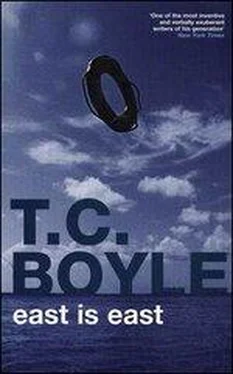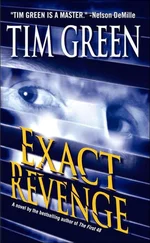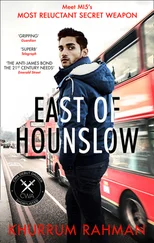Tom Boyle - East is East
Здесь есть возможность читать онлайн «Tom Boyle - East is East» весь текст электронной книги совершенно бесплатно (целиком полную версию без сокращений). В некоторых случаях можно слушать аудио, скачать через торрент в формате fb2 и присутствует краткое содержание. Жанр: Современная проза, на английском языке. Описание произведения, (предисловие) а так же отзывы посетителей доступны на портале библиотеки ЛибКат.
- Название:East is East
- Автор:
- Жанр:
- Год:неизвестен
- ISBN:нет данных
- Рейтинг книги:5 / 5. Голосов: 1
-
Избранное:Добавить в избранное
- Отзывы:
-
Ваша оценка:
- 100
- 1
- 2
- 3
- 4
- 5
East is East: краткое содержание, описание и аннотация
Предлагаем к чтению аннотацию, описание, краткое содержание или предисловие (зависит от того, что написал сам автор книги «East is East»). Если вы не нашли необходимую информацию о книге — напишите в комментариях, мы постараемся отыскать её.
, praised by
in
as "one of the most exciting young fiction writers in America," the result is a sexy, hilarious tragicomedy of thwarted expectations and mistaken identity, love, jealousy, and betrayal.
East is East — читать онлайн бесплатно полную книгу (весь текст) целиком
Ниже представлен текст книги, разбитый по страницам. Система сохранения места последней прочитанной страницы, позволяет с удобством читать онлайн бесплатно книгу «East is East», без необходимости каждый раз заново искать на чём Вы остановились. Поставьте закладку, и сможете в любой момент перейти на страницу, на которой закончили чтение.
Интервал:
Закладка:
Step by tottering step, he approached the mass of shadow that was the cabin. Going to school, living with his obāsan, swabbing the galley of the Tokachi-maru, he’d almost forgotten his own physicality, and here he was, playing another children’s game: red light, green light. He took a step and then froze. Two steps. And then another. When he was close, when he could distinguish the horizontal bar of the porch railing from the clot of shadows behind it, he felt a surge of joy. The clothes: there they were! He reached out to the material, the white T-shirt palely glowing. She’d been true to him after all—she was his ally, his friend, his comfort and support, and she did play by the rules, she did, though he must have been as strange to her as she was to him. In that moment, he loved her.
In the next, he was crestfallen. She’d brought him antiseptic and bandages, water and soap and clothing that smelled of scented detergent and the tumble-dryer—but she’d forgotten the most important thing, the thing that made his gut seize and cry out in peristaltic anguish: she’d forgotten food. The apples, dates and crackers, the box lunch, they were nothing, a distant memory, and a great howling inconquerable hunger took hold of him like rage. The bitch, the stupid bitch, she’d forgotten to bring him food!
All right. But he had the clothes, the soap, he had clear clean potable water. Or at least he assumed it was clear, clean and potable—he could barely make out the basin in the black of the night. He bent his face tentatively to the basin and drank, and to his joy he found the water sweet and fresh, with no taint of the swamp—had water ever tasted so good? Then he stripped off his rags, fumbled for the washcloth and soap and began a long slow luxurious lathering which he interrupted only long enough to stave off the mosquitoes.
When he’d finished, he stood and upended the basin over his head and then filled it again—at least she’d thought to leave the water jug on the porch, he muttered to himself, his gratitude drowned in outrage: no food—Band-Aid strips, but no food! He wet his hair, soaped and rinsed it and wet it again. Then he sat on the front steps, still naked, and cut the burrs and thistles and twigs out of it with his penknife. He didn’t have much of a beard—a few sparse hairs curling from his chin and darkening his upper lip—and these he tried to cut too, but with less success. Finally, he reached for the shorts and slipped into them with all the satisfaction of a half-grown boy slipping into his yukata after a long hot soak.
He carried the T-shirt and the tennis shoes, Jōchō and his penknife into the dark cabin with him. For a moment he stood there in the darkness, smelling her, a sweetness of the flesh and a hint of western perfume that lingered like spice on the air. The cabin was deserted. He remembered the hot plate and the tin of crackers. She must have something here, he thought, anything. And then he took a risk: he fumbled round the place, lost in utter blackness, till he found her desk lamp and switched it on.
The room sprang to life, a dazzle of color and dimension—a room, habitable space, four walls and a roof. He was inside. He’d spent his whole life inside, and now he was inside again. The windows glared at him, opaque with light, and he knew he was visible to anyone standing out there in the night… but he didn’t care. Not now. Not anymore. All he cared about now was food. And where was it? Where did she keep it? He scanned the room—the rows of books, the typewriter with its curling page, the fireplace, the chairs and loveseat—finally settling on the flimsy little table that held the hot plate. There were coffee things there: a mug, a spoon, a ceramic container with packets of Sweet’n Low and non-dairy creamer, a boldly labeled jar of decaf. And that was it. Nothing else. Nothing to eat.
For the next half hour he sat there in a pool of golden light, treating his wounds and sipping decaffeinated coffee—one cup after another. There wasn’t much nutrition in it, he knew—some soya protein in the creamer, maybe—but he loaded his cup with the artificial sweetener and the packets of dry yellowish powder and told himself he was having a rich and satisfying meal. He dabbed gingerly at his torn flesh, examined his poor battered feet like a pensioner in his garret. He squeezed the pus and flecks of dirt from the infected cuts and abrasions that striped him from head to toe, treated them with stinging iodine and soothing peroxide, and applied the Band-Aids one atop the other till his legs and arms and chest were a pale wheeling collage of plastic strips. He took his time, and his heart beat like a clock, strong and steady. To be here, to be inside, in this space separated from the hard ground and naked sky, was a quiet miracle. That it was her space, that she was here during the gathering hours of the day, made it all the sweeter. He felt, at long last, that he’d been rescued.
When he was done—when he’d used all the Band-Aids, drunk all the creamer and emptied all the packets of Sweet’n Low—he flicked off the lamp and stretched out on the wicker loveseat. He would spend the night—this one, at least—under a roof, instead of scrabbling around in the mud like an animal. God, how he hated nature. Hated the festering stink and the wet and the gnats in his eyes and ears and nostrils. The wicker was hard beneath him, but it didn’t matter. He closed his eyes and settled himself, the obscene drama of the night, with all its comings and goings, its little deaths and devourings, its spiders and snakes and chiggers, out there where it belonged.
The problem was, he couldn’t sleep. He was exhausted, worn-out, as weary and heartsick as any human being on the planet, and he couldn’t sleep. He kept seeing her, the woman, the Amerikajin, rehearsing her face and her body over and over again: the moment she turned to him, the rustled silk of her voice. And then he was thinking of his obāsan and how when he was small and couldn’t sleep she would read to him in the glowing little circle of the tensor lamp beside his bed. She hadn’t liked Mishima, hadn’t liked it when he gave up baseball for Jōchō and his Hagakure. And then he remembered the nights he couldn’t sleep because of the clenching in his gut over the ijime —the bullying—they put him through in high school, and how Jōchō had been his hope and solace.
Hiro was seventeen when he discovered Hagakure —or rather, Yukio Mishima’s appreciation of it, The Way of the Samurai. He was a boy in school, a bēsubōru player—there, on the field, he was the equal of anyone—and he’d never heard the name of Jōchō or of Mishima either. He played ball with savage devotion, the harsh unpronounceable names of the gaijin stars like an incantation on his lips: Jim Paciorek, Matt Keough, Ty Van Burkelo. They were his inspiration, his hope. You could be a mongrel, a half-breed, you could be anything, and all that mattered was that you got a hit when you stepped up to the plate. That was democracy. That was fea purē. That was revenge. Fujima, Morita, Kawakami, the very insects who’d blackened his eyes and broken his nose, the ones who hissed bata-kusai at his back as he made his way down the corridor, these were the ones he silenced with his bat. They squinted at him from the pitcher’s mound, from shortstop and centerfield, chanting their obscenities and waving their mitts to distract him, till his bat met the ball and their legs fell out from under them. Bēsubōru, that was his life.
And then one day, walking home from school and attracting the usual stares on the street—everyone knew at a glance that he wasn’t Japanese, that he was something else, something alien, and their eyes flew to him and then dropped away as if he were dead, inanimate, a post, a tree, a smear on the sidewalk—he found himself gawking at a poster in a bookstore window. The poster—it was a blown-up photo, in black and white—showed a nearly naked man in the throes of death. He’d been lashed to a tree, his hands bound over his head, and three stark black arrows protruded from his flesh. One penetrated his lower abdomen, just above the folds of his crude breechcloth, another radiated from his side, while the third was thrust nearly to the hilt in the dark clot of hair beneath his arm. His eyes were half open, staring off toward the heavens in glazed rapture, and his mouth was a fierce dark slash of agony and release. He had the musculature of a hero.
Читать дальшеИнтервал:
Закладка:
Похожие книги на «East is East»
Представляем Вашему вниманию похожие книги на «East is East» списком для выбора. Мы отобрали схожую по названию и смыслу литературу в надежде предоставить читателям больше вариантов отыскать новые, интересные, ещё непрочитанные произведения.
Обсуждение, отзывы о книге «East is East» и просто собственные мнения читателей. Оставьте ваши комментарии, напишите, что Вы думаете о произведении, его смысле или главных героях. Укажите что конкретно понравилось, а что нет, и почему Вы так считаете.











